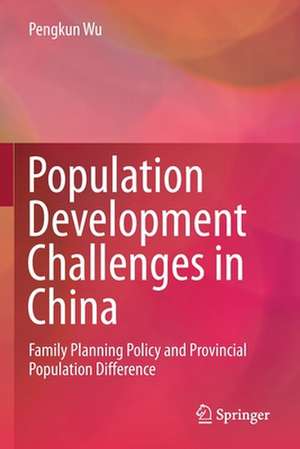Population Development Challenges in China: Family Planning Policy and Provincial Population Difference
Autor Pengkun Wuen Limba Engleză Paperback – 14 sep 2021
| Toate formatele și edițiile | Preț | Express |
|---|---|---|
| Paperback (1) | 638.76 lei 6-8 săpt. | |
| Springer Nature Singapore – 14 sep 2021 | 638.76 lei 6-8 săpt. | |
| Hardback (1) | 644.95 lei 6-8 săpt. | |
| Springer Nature Singapore – 13 sep 2020 | 644.95 lei 6-8 săpt. |
Preț: 638.76 lei
Preț vechi: 751.47 lei
-15% Nou
Puncte Express: 958
Preț estimativ în valută:
122.28€ • 125.83$ • 103.08£
122.28€ • 125.83$ • 103.08£
Carte tipărită la comandă
Livrare economică 01-15 martie
Preluare comenzi: 021 569.72.76
Specificații
ISBN-13: 9789811580123
ISBN-10: 981158012X
Ilustrații: XIX, 241 p. 65 illus., 26 illus. in color.
Dimensiuni: 155 x 235 mm
Greutate: 0.37 kg
Ediția:1st ed. 2020
Editura: Springer Nature Singapore
Colecția Springer
Locul publicării:Singapore, Singapore
ISBN-10: 981158012X
Ilustrații: XIX, 241 p. 65 illus., 26 illus. in color.
Dimensiuni: 155 x 235 mm
Greutate: 0.37 kg
Ediția:1st ed. 2020
Editura: Springer Nature Singapore
Colecția Springer
Locul publicării:Singapore, Singapore
Cuprins
Chapter 1. Introduction.- Chapter 2. The Serious Population Problems in China.- Part I: Challenge One: Designing Suitable Family Planning Policy.- Chapter 3. Population Development under Old One-child Family Planning Policy.- Chapter 4. Population Development under Single Two-child Family Planning Policy.- Chapter 5. Population Development under New Two-child Family Planning Policy.- Chapter 6. Reforming paths of China’s Family Planning policy.- Part II: Challenge Two: Facing Serious Provincial Population Difference.- Chapter 7. Reforming Necessity of Family Planning Policy Among Different Provinces.- Chapter 8. Correlation Degree of Starting Time and Reforming Necessity of Family Planning Policy Among Different Provinces.- Chapter 9. Spatial Econometric Analyses of Population Structure Among Different Provinces.- Chapter 10. Conclusions and Suggestions.
Notă biografică
Pengkun Wu received two Ph.D. degrees from The Hong Kong Polytechnic University and Harbin Institute of Technology. He is currently an Associate Professor at Sichuan University. His research interests are China’s population development, decision support systems and e-commerce. He has published over 10 papers in some international journals, such as Decision Support Systems, Applied Mathematical Modelling, Social Indicators Research, Quality & Quantity and Journal of the Operational Research Society.
Textul de pe ultima copertă
This book explores the population development challenges in China. It started by analyzing two of the major challenges: designing a suitable family planning policy and dealing with the serious provincial population difference. It then proposes effective measures to address these challenges by adopting various quantitative methods, such as system dynamics, nonlinear programming and spatial econometrics in evaluating the effects of different policy scenarios, which made the results more scientific and reliable, thus the final policy suggestions effective and evidence based. The book includes a number of mathematical models and is suitable for graduate students and researchers in population modeling and relevant research areas.
Caracteristici
Adopts various quantitative methods to analyze China’s population Discusses the serious provincial population differences in China Simulates China’s population development under three different family planning policies and designs a suitable policy accordingly
